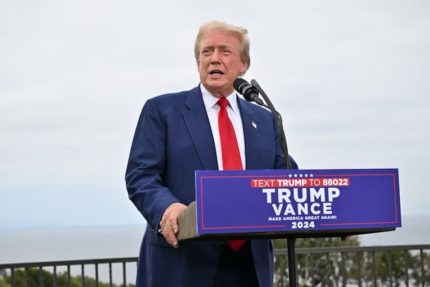Former President Donald Trump has issued a contentious call to Republican senators, urging them to block President Joe Biden’s judicial nominees. In a post on Truth Social, Donald Trump accused Democrats of attempting to “stack the Courts with Radical Left Judges.” His directive has been perceived as a deliberate move to disrupt the administration’s efforts to fill critical judicial vacancies before the next presidential inauguration.
Donald Trump’s statement, which includes the demand for GOP lawmakers to “Hold the Line,” highlights his ongoing influence over the Republican Party. This maneuver signals his intent to shape the judiciary in favor of conservative ideologies. Critics argue that Donald Trump’s push undermines the democratic mandate given to Biden by the American electorate and escalates partisan tensions in an already polarized political landscape.
The Senate Showdown: Democrats Push Back Against GOP Obstruction
Despite Donald Trump’s calls for obstruction, Democrats maintain control of the Senate and are accelerating efforts to confirm judicial appointments. The Biden administration, aware of the potential ramifications of an obstructed judiciary, has prioritized appointing judges who reflect progressive values and legal expertise.
Senate Majority Leader Chuck Schumer has signaled an aggressive confirmation strategy, emphasizing the importance of countering the judicial influence cultivated during Donald Trump’s presidency. By expediting votes, Democrats aim to fortify the judiciary against a possible conservative resurgence under a future Trump administration.
Weekend Sessions and Holiday Work: Democrats’ Commitment to Judicial Balance
In response to Donald Trump’s directive, Democrats are considering working overtime, including weekends and the Christmas recess, to finalize as many judicial appointments as possible. This approach underscores the high stakes involved in ensuring a balanced judiciary capable of upholding democratic principles and civil rights.
The urgency is driven by the recognition that a shift in Senate control could derail Biden’s efforts. Legal experts stress that the judiciary plays a pivotal role in shaping U.S. policy, from voting rights to environmental regulations, and must remain insulated from partisan interference.
Republican Senators Face Crossroads Amid Donald Trump’s Pressure
Donald Trump’s influence on GOP senators creates a political dilemma, as some lawmakers grapple with balancing party loyalty against institutional responsibilities. While staunch Donald Trump allies may heed his call, moderate Republicans face increased scrutiny from constituents advocating for a functional judiciary.
This internal GOP division highlights broader questions about the party’s direction and its willingness to prioritize governance over partisanship. Analysts suggest that Donald Trump’s directive may alienate moderate voters, potentially weakening the GOP’s standing in upcoming elections.
Judicial Appointments: A Battle for the Future of the Republic
The fight over judicial nominations reflects a larger struggle for the soul of American democracy. Donald Trump’s attempts to stall Biden’s appointments are part of a broader conservative strategy to secure long-term influence over the judiciary, which has already been reshaped by his previous administration.
Democrats, on the other hand, view these appointments as essential for safeguarding constitutional protections and promoting progressive reforms. The outcome of this battle will have lasting implications for key legal issues, including reproductive rights, immigration policy, and climate action.
Public Reaction: A Nation Divided Over Judicial Politics
Donald Trump’s directive has sparked a wave of reactions, with his supporters lauding the move as a stand against liberal overreach. Conversely, critics decry it as an attack on the democratic process, accusing Donald Trump of prioritizing partisan goals over the nation’s well-being.
Grassroots organizations and advocacy groups are mobilizing on both sides, urging their supporters to pressure senators into action. This public outcry illustrates the deep divisions within the country and highlights the judiciary’s role as a critical battleground in America’s ongoing political struggle. By adopting this approach, Democrats and Republicans alike acknowledge the judiciary’s immense power in shaping the nation’s future—making the current standoff a defining moment in U.S. political history.














